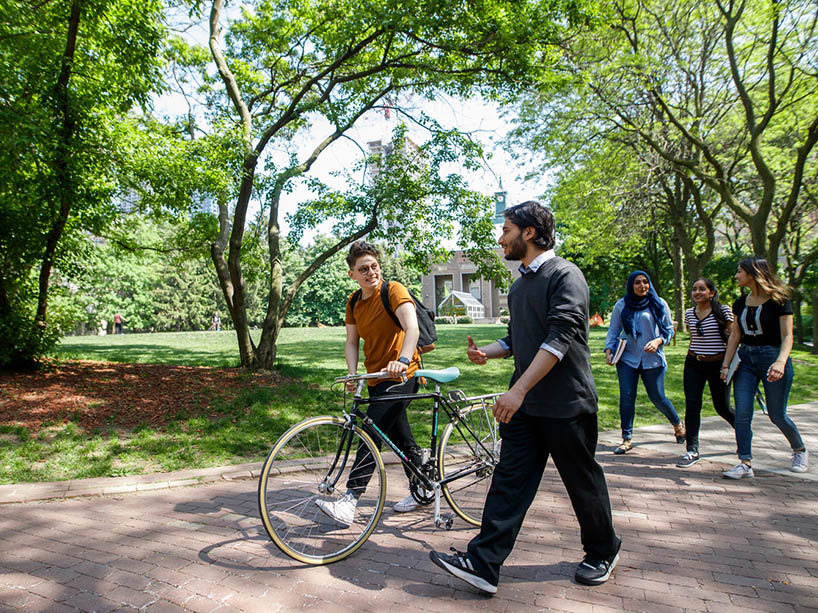Get biking this summer with expert tips from TMU cyclists
Join the TMU community in celebrating Bike Month this June with tips from frequent cyclists on safety, bike routes and campus resources.
June is Bike Month – an annual celebration of cycling, a time to learn new skills and get outside to explore the city. At TMU, community members are invited to participate in Bike to Campus week from June 23–29.
To mark the occasion, TorontoMet Today spoke to a group of dedicated TMU cyclists about how they started biking to campus. They also explained the health, environmental and other benefits they experience, and offered their cycling tips.
“Biking is a sustainable mode of transportation that produces zero emissions, reducing air pollution and greenhouse gas emissions. By biking, you're minimizing your carbon footprint and contributing to a healthier planet.” said Sharmilla Raj, manager of TMU’s sustainability office.
“Regular biking also improves heart health, muscle strength and flexibility. It's a fun way to incorporate exercise into your daily routine, releasing endorphins that reduce stress and anxiety, enhancing your overall mental well-being.”
If you’re thinking about biking more this summer, here are some tips to maximize safety and ensure a smooth ride. Plus, read about resources and services available to cyclists on campus.
Find the right fit
As a first step, it’s important to make sure that your bike is the perfect match for you. “Make sure the bike you choose for your commute is the right size and geometry for you with a saddle that supports your sit bones — if your bike isn’t comfortable, you won’t ride,” Raj said.
If you need some guidance, the Sustainability Office is hosting its annual bike clinic event for community members. Drop by on Wednesday, June 26 for free bike tune-ups, information on cycling routes and finding the right bike for you.
Ease into it
Start with a gradual schedule to allow your body to adjust to cycling. Build your strength and stamina over time to minimize discomfort and fatigue.
TMU has several Bike Share stations on campus and in the surrounding area. Bike Share Toronto (external link) offers convenient access to thousands of bikes (including electric bikes) for commuters. Novice cyclists can start by using Bike Share to plan and ride short distances – from a nearby subway station to campus, for instance.

Increased cycling supports two of the three long-term goals outlined in TMU’s Sustainability Action Plan.
Safety first
Prioritize safety gear to protect yourself and your bike.
“Always use a properly fitted helmet, consider applying sunscreen and wear sunglasses to protect your eyes from wind and road grit,” Raj said. “There are many affordable lights you can get; these are required by Ontario traffic laws, and reflective vests keep you visible when commuting at dusk.”
Cyclists recommend choosing a pannier or basket that is weatherproof and keeps your cargo secure. “Nothing is as disheartening as watching your cellphone bounce out of a basket into traffic after hitting an unexpected pothole,” Raj said.
Use the best bike lock you can afford — like a U-lock — and always lock both your frame and a wheel to the bike rack or post. This not only prevents wheel theft, it also helps keep your bike vertical, so it won’t fall over into the sidewalk or street.
While parking, look for a spot in highly visible areas with a lot of foot traffic where would-be thieves cannot operate unseen.
There are more than 1,100 outdoor bicycle parking locations on campus, including both TMU-owned and City-owned bike racks or ‘post and ring’ style racks. The Daphne Cockwell Health Sciences Complex (DCC) also offers 98 reserved secure bicycle parking spaces available by permit to students, faculty and staff.
Dress for success
It’s critical to wear comfortable clothing and sensible footwear that is suitable for a light workout. Frequent cyclists suggest giving yourself plenty of time to change your outfit if needed and freshen up when you reach your destination.
“I want to stay feeling fresh for the rest of the day and give myself time to address any ‘helmet hair’ before I settle in for the day,” Raj said.
The DCC has dedicated washroom and shower facilities that community members can access with their OneCard if they have a reserved secure bicycle parking permit.
Embrace the journey
Remember to enjoy the experience and ride at a leisurely pace – whether you're starting your day with some light exercise or unwinding with a bike ride at the end of the day.
Take advantage of designated bike lanes to ensure a safe and smooth ride in the city. “Plan out your route, take your time, and use lanes like those along Gerrard Street, Richmond Street, Adelaide Street and Shuter Street,” Raj said.
In April 2024, TMU released its first Sustainability Action Plan – a five-year roadmap for the university community with three key goals: achieving a platinum STARS sustainability rating (external link) by 2035, a zero-waste campus by 2035 and net-zero scope one and two emissions by 2045.
“As more TMU community members bike to campus, we reduce our overall carbon footprint and our dependence on fossil fuels, which is a key metric in the STARS rating,” Raj explained. “An increase in cycling also likely means that there would be fewer cars on campus, leading to lower demand for parking facilities, and therefore reduced energy consumption and emissions.”
TMU’s Campus Master Plan and the City of Toronto’s long-term priorities continue to prioritize sustainable modes of travel and active transportation. The university’s recent Campus Core Revitalization project led to enhanced outdoor infrastructure with improvements in the quality, safety, accessibility and sustainability of public spaces.
“The project included enhancements to intersections, shared routes and transition areas where pedestrian and bike routes meet local roadways to address conflict areas and support easy access to the City’s cycling network,” Raj said.